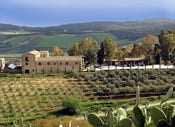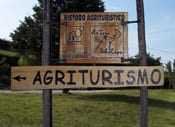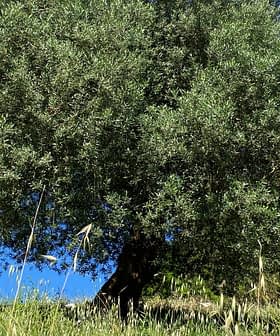Italy is the most rural of all countries in Western Europe, with the smallest urban population and a countryside teaming with small towns and the farms that are their foundations. For foreigners, the dreamy image of Italy is constituted as much by the green vineyard towns of Tuscany as it is the ancient capital ruins of Rome. For the interested traveler, the rural side of Italy is there to partake in, thanks to the advent of agriturismi.
 The government created the category of agriturismo to keep the country’s precious small farms sustainable, allowing them to open their doors and welcome visitors to spend a vacation on their properties. It functions as an exchange, with farmers able to supplement their incomes, and visitors able to get a taste of the quiet, bucolic, and delicious reality that is farm life.
The government created the category of agriturismo to keep the country’s precious small farms sustainable, allowing them to open their doors and welcome visitors to spend a vacation on their properties. It functions as an exchange, with farmers able to supplement their incomes, and visitors able to get a taste of the quiet, bucolic, and delicious reality that is farm life.
In 1985, a piece of inventive legislation combined the words agricultura and turismo to add a new opportunity for the nation’s struggling farms, and a new form of sightseeing was born. Since then, small producers of Italy’s bounty — wine, fruits and vegetables, cheese, olive oil — have opened their doors to visitors who are welcomed to stay for a few nights and experience the agrarian way of life. It is a way to live within the nature that is far different from a hike in the mountains or a remote seaside escape. At an agriturismo, you see firsthand, and can even participate in, a kind of lifestyle that coexists with nature, a human experience that depends on nature for sustenance.
Verdant and hilly, the region of Umbria is home to over 1200 agriturismi, many of them devoted to the region’s olive oil production, such as the popular Agriturismo Antico Frantoio-Anghiariand Agriturismo Le Olive di Nedda which both offer breath-taking views of their olive groves and the surrounding rolling landscape. At any of the agriturismi, facilities vary from the most rustic, traditional stone house, to places that have been renovated with luxurious pools and saunas, however they are not hotels.

People come to stay at the farms to reconnect with nature, usually spending days hiking or cycling around the area, or participating in the farm work. If you’ve ever wanted to pick olives or watch a millstone press out the deep green oil, time your vacation right and this is your chance. Meals are a big as part of your stay, so you can look forward to dining on farm-fresh ingredients prepared by knowing local hands. Worlds away from a traditional restaurant, this experience lets you truly eat like a local while chatting with someone who is passionate about the food, because they grow it.
The agriturismi offer a very personal introduction to rural life in Italy, allowing you to peer into the process of growing and producing food, to remind you how dependent even the most metropolitan of us are on the land. Instead of a concierge, you will be met by a person who is welcoming you to the land they love and tend, and can show you a side of life that may be a mystery to you but is still fundamental to your own.








